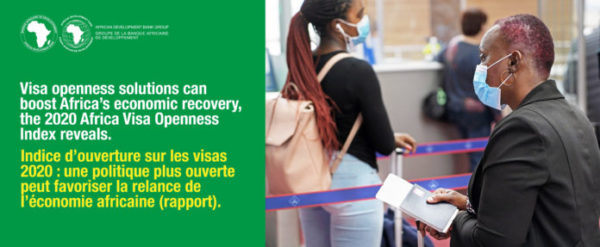- 54% of the countries of the continent, a record percentage, are accessible to African travelers without a visa or who can obtain one upon arrival in the country of destination.
In 2020, The Gambia joined Seychelles and Benin as a country allowing visa-free entry to their territories for all African travelers.
Twenty-four African countries issue electronic visas, which represents 44% of countries on the continent.
The trend increase in African countries to liberalize their visa granting conditions and to accommodate African travelers more easily continues, according to the 2020 Africa Visa Openness Index report published on Thursday, December 10 , by the African Union Commission and the African Development Bank.
This fifth edition of the Index nevertheless highlights the negative impact of the Covid-19 pandemic, which threatens the continent’s economic gains in recent years both in tourism and in the productive investment sector. As travel restrictions ease and security measures are put in place to contain the pandemic, sustaining the progress and momentum for easier travel in Africa is critical.
The 2020 Index shows that 54% of the continent’s countries – a record percentage – are accessible to African travelers without needing a visa to travel or being able to obtain one upon arrival (+ 9% since 2016). In 2020, The Gambia joined Seychelles and Benin as a country allowing Africans entry into their territories without visas. Twenty countries rose in the Index rankings while fifty of them improved or maintained their scores. The report reveals a significant increase in the number of electronic visas, made available by twenty-four African countries.
Despite the gains made, the results show that Africans still need visas to travel to 46% of countries on the continent. Countries in East and West Africa score the best among the best performing countries and serve as examples for other regions. The findings, which emerge from the Index, highlight the need to prioritize visa openness responses in large and small economies, with the biggest gains going to business, investment, innovation and tourism. Further facilitate the free movement of persons,
goods and services will become even more important from January 1, 2021, the date of the start of trade under the African Continental Free Trade Area (AfCFTA).
“As the evolving repercussions of the Covid-19 pandemic show, countries must increasingly look beyond their national borders to improve their economic prospects,” said Khaled Sherif, vice president of the Bank African Development Agency, responsible for regional development, regional integration and service delivery. Opening up to visas will help Africa reposition its future growth. ”
Nearly half of destinations in Africa are experiencing easing of travel restrictions, in line with pandemic management plans. However, travel safety and security remains at the forefront of the minds of policymakers and citizens when it comes to opening borders as governments update their travel authorization rules. .
“As the time has come to reopen and safely revive economies in Africa, it is imperative to put in place measures that propel the continent and all of its citizens into the future. Liberalizing a country’s visa requirements is a political tool that can be quickly adopted to achieve this, ”said Ambassador Kwesi Quartey, vice-chair of the African Union Commission.



